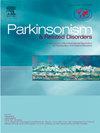GLP‐1 receptor agonists for Parkinson's disease: An updated meta-analysis
IF 3.4
3区 医学
Q2 CLINICAL NEUROLOGY
引用次数: 0
Abstract
Introduction
Treatments for Parkinson's disease (PD) focus on symptom reduction through dopaminergic therapies, without clear evidence of disease-modifying effects. Glucagon-like peptide-1 (GLP-1) receptor agonists may reduce neuroinflammation by decreasing microglia activation in PD. Clinical trials suggest these agents have disease-modifying potential in PD.
Objective
Evaluate the efficacy of GLP-1 receptor agonists in PD.
Methods
PubMed, Embase and Cochrane Library were searched to identify randomized controlled trials (RCTs) of GLP-1 agonists for PD, up to July 2024. The risk of bias was assessed using the RoB-2 tool, and statistical analysis was performed with RevMan 5.4.1 software.
Results
GLP-1 receptor agonists showed a beneficial effect on MDS-UPDRS part III motor scores compared to placebo. Off-medication state, there was a −1.22 point improvement (95%CI -2.46, 0.22; P = 0.05). On-medication state, scores improved by −2.52 points (95%CI -4.02, −1.01; P = 0.001). The global MDS-UPDRS score showed a −3.43-point difference (95%CI -6.48, −0.48; P = 0.02). Cognitive performance, assessed via the Mattis DRS-2, improved by 1.32 points (95%CI 0.16, 2.52; P = 0.03). There were no significant differences in the NMSS (−0,19; 95%IC -3,44, 3,05; P = 0.91), in MADRS (−1,04; 95%IC -2,57, 0,48; P = 0.18), or PDQ-39 (−0,91; 95%IC -2,22, 0,39; P = 0.17).
Conclusion
GLP-1 receptor agonists improved motor and cognitive performance in PD, suggesting potential symptomatic benefits. However, further studies are needed to evaluate their long-term effects and their role in disease modification, especially considering ethnic and disease severity variations.
GLP-1受体激动剂治疗帕金森病:最新荟萃分析
帕金森氏病(PD)的治疗侧重于通过多巴胺能治疗减轻症状,没有明确的疾病改善作用的证据。胰高血糖素样肽-1 (GLP-1)受体激动剂可能通过降低PD中小胶质细胞的激活来减轻神经炎症。临床试验表明,这些药物在帕金森病中具有改善疾病的潜力。目的:评价GLP-1受体激动剂治疗帕金森病的疗效。方法:检索PubMed, Embase和Cochrane图书馆,以确定截至2024年7月GLP-1激动剂治疗PD的随机对照试验(rct)。偏倚风险评估采用rob2工具,统计分析采用RevMan 5.4.1软件。结果:与安慰剂相比,GLP-1受体激动剂对MDS-UPDRS第三部分运动评分有有益影响。停药状态,改善-1.22点(95%CI -2.46, 0.22;p = 0.05)。服药状态下,得分提高-2.52分(95%CI -4.02, -1.01;p = 0.001)。全球MDS-UPDRS评分差异为-3.43分(95%CI -6.48, -0.48;p = 0.02)。通过Mattis DRS-2评估的认知表现提高了1.32点(95%CI 0.16, 2.52;p = 0.03)。NMSS差异无统计学意义(-0,19;95%ic - 3,44,3,05;P = 0.91),在MADRS中(-1,04;95%ic -2,57, 0,48;P = 0.18),或PDQ-39 (-0,91;95%ic - 2,22,0,39;p = 0.17)。结论:GLP-1受体激动剂改善PD患者的运动和认知能力,提示潜在的症状益处。然而,需要进一步的研究来评估它们的长期影响及其在疾病改变中的作用,特别是考虑到种族和疾病严重程度的差异。
本文章由计算机程序翻译,如有差异,请以英文原文为准。
求助全文
约1分钟内获得全文
求助全文
来源期刊

Parkinsonism & related disorders
医学-临床神经学
CiteScore
6.20
自引率
4.90%
发文量
292
审稿时长
39 days
期刊介绍:
Parkinsonism & Related Disorders publishes the results of basic and clinical research contributing to the understanding, diagnosis and treatment of all neurodegenerative syndromes in which Parkinsonism, Essential Tremor or related movement disorders may be a feature. Regular features will include: Review Articles, Point of View articles, Full-length Articles, Short Communications, Case Reports and Letter to the Editor.
 求助内容:
求助内容: 应助结果提醒方式:
应助结果提醒方式:


